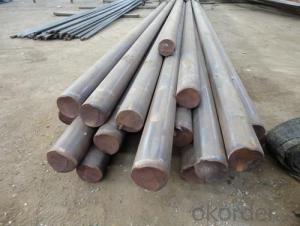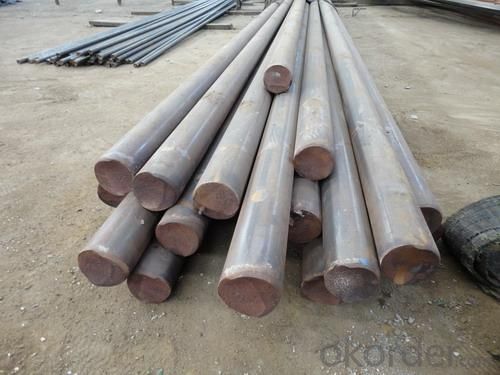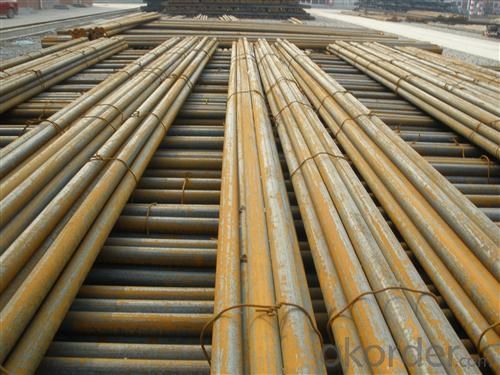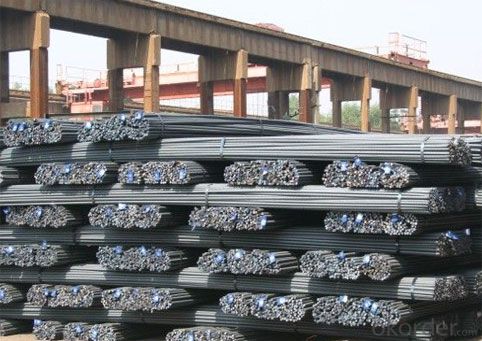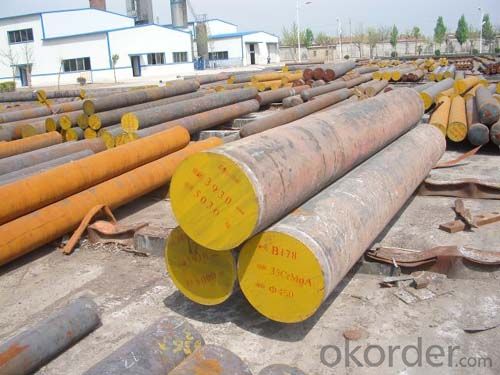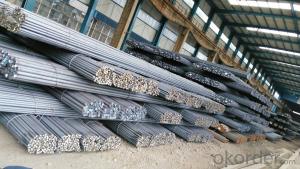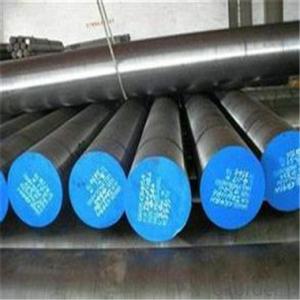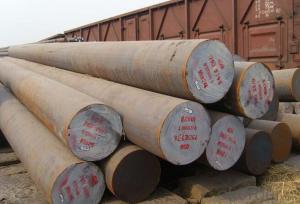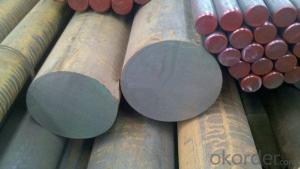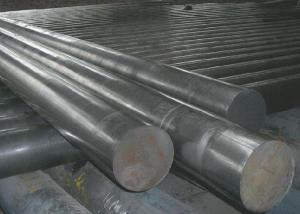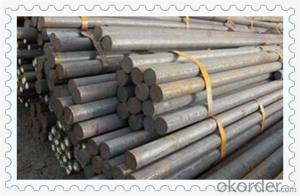Cold Work Die Steel D2 Steel Rod Steel Round Bar
- Loading Port:
- China main port
- Payment Terms:
- TT OR LC
- Min Order Qty:
- 25 m.t.
- Supply Capability:
- 10000 m.t./month
OKorder Service Pledge
OKorder Financial Service
You Might Also Like
Specification
The details of our Steel
1. Produce Standard: as the GB, AISI, ASTM, SAE, EN, BS, DIN, JIS Industry Standard
2. Produce processes: Smelt Iron -EAF smelt Billet - ESR smelt Billet -Hot rolled or forged get the steel round bar and plate
3. Heat treatment:
Normalized / Annealed / Quenched+Tempered
4. Quality assurance:
All order we can received Third party inspection, You can let SGS, BV,.. and others test company test and inspect our products before Goods shipping.
Product information
Product Names | D2 high speed steel rod |
chemical composition(%) | C:1.50 Si:0.35 Mn:0.35 Mo:0.85 Cr 12.10 W:0.40Max V:0.60 |
Shape | sheet,round bar.pipe,tube,flate |
Delivery time | delivered after 7-15 days |
Grades | AISI D2,DIN 1.2379,JIS SKD10 |
Diameter | 16mm-600mm |
Price | 30% in advance and balance before delivary |
Payment terms | T/T,L/C,D/P,D/A,and so on |
Lifting capacity | 5000 tons per month |
Application | Twist drills, Broaches, Milling cutters, Reamers, End mills, Bandsaws ect. |
Product show

Workshop show

- Q: How does special steel contribute to the wear resistance of products?
- Special steel contributes to the wear resistance of products by offering superior hardness, strength, and durability compared to regular steel. Its unique composition, which may include additional alloying elements like chromium, nickel, or molybdenum, enhances its ability to withstand friction, abrasion, and other forms of wear. This enables products made from special steel to have a longer lifespan and perform effectively in demanding applications, reducing the need for frequent replacements and maintenance.
- Q: What are the limitations of using special steel?
- There are several limitations to using special steel. Firstly, it is more expensive compared to regular steel, making it less accessible for certain industries or applications with budget constraints. Additionally, special steel may have limited availability and may require longer lead times for production and delivery. Moreover, the complex manufacturing processes involved in producing special steel can result in higher energy consumption and environmental impact. Lastly, the unique properties of special steel may not always be necessary or beneficial for every application, making it more suitable for specific industries or niche uses.
- Q: What are the different methods of testing the quality of special steel?
- There are various methods to test the quality of special steel, including mechanical tests such as tensile testing, hardness testing, impact testing, and fatigue testing. Additionally, chemical analysis techniques like spectroscopy and metallography can be used to determine the chemical composition and microstructure of the steel. Non-destructive testing methods like ultrasonic testing and magnetic particle inspection are also commonly employed to detect any defects or anomalies in the steel.
- Q: How does special steel contribute to reducing product weight while maintaining strength?
- Special steel contributes to reducing product weight while maintaining strength through its unique properties and composition. Special steel often has a higher strength-to-weight ratio compared to other materials, allowing manufacturers to use less steel without compromising on strength. Additionally, special steel can be engineered to have specific characteristics, such as high tensile strength or corrosion resistance, further enhancing its performance. By utilizing special steel, manufacturers can create lighter products without sacrificing durability, resulting in reduced weight and improved efficiency.
- Q: What are the main applications of special steel in the packaging industry?
- The main applications of special steel in the packaging industry include the manufacturing of containers, cans, and closures. Special steel offers excellent strength, durability, and corrosion resistance, making it suitable for packaging materials that need to withstand various environmental conditions and protect the contents inside. Its high tensile strength also allows for thinner and lighter packaging, reducing material usage and transportation costs. Additionally, special steel is used in machinery and equipment used for packaging processes, ensuring efficiency and reliability in the production line.
- Q: How does special steel contribute to the construction of bridges?
- The utilization of special steel is of utmost importance in the construction of bridges as it provides enhanced strength, durability, and resilience, thereby guaranteeing the structural integrity and safety of these vital infrastructure projects. One of the main advantages of special steel in bridge construction lies in its high tensile strength, allowing it to endure heavy loads and extreme weather conditions. This strength is particularly crucial in large-span bridges, where the steel must bear significant weight and withstand forces like wind, earthquakes, and traffic vibrations. Additionally, special steel offers exceptional corrosion resistance, which is essential for bridges exposed to harsh environments, such as those in close proximity to coastal areas where saltwater can be highly corrosive. By preventing or minimizing corrosion, the lifespan of the bridge is significantly prolonged, resulting in reduced maintenance and repair costs. Furthermore, special steel can be fabricated to precise specifications, allowing for the creation of intricate bridge designs and innovative structural solutions. This flexibility enables engineers to design bridges that are not only functional but also visually appealing. In conclusion, special steel is a vital element in bridge construction due to its strength, durability, corrosion resistance, and adaptability. Its utilization ensures the longevity, safety, and efficiency of bridges, ultimately benefiting the communities they serve.
- Q: Can special steel be used in the aerospace defense industry?
- Yes, special steel can be used in the aerospace defense industry. Special steel alloys, such as titanium, stainless steel, and nickel-based alloys, are commonly used in aerospace applications due to their exceptional strength, corrosion resistance, and high-temperature capabilities. These materials are often employed in manufacturing aircraft components, rocket engines, missile systems, and other defense-related structures to ensure superior performance and durability in extreme conditions.
- Q: How does special steel perform in cryogenic conditions?
- Special steel performs well in cryogenic conditions. Its low temperature resistance allows it to maintain its strength, toughness, and ductility even at extremely cold temperatures. This makes it suitable for various applications in cryogenic industries, such as liquefied natural gas (LNG) storage tanks, aerospace components, and medical equipment. Additionally, special steel's resistance to brittleness and corrosion ensures its reliability and durability in these challenging environments.
- Q: What are the limitations of welding special steel?
- Considerations need to be made for several limitations associated with welding special steel. Firstly, special steel, such as high-alloy steels or heat-resistant steels, often contains higher levels of carbon, which increases the risk of cracking during welding. To minimize this risk, it is necessary to carefully control preheating, interpass temperature, and post-weld heat treatment. Another limitation is the potential for distortion and warping during welding. Special steels have different thermal conductivity and expansion coefficients compared to carbon steels, causing them to dissipate heat more quickly and be more susceptible to distortion. To minimize these effects, proper clamping and fixturing techniques are required. Impurities, such as sulfur and phosphorus, can also affect special steels, leading to the formation of brittle compounds during welding. To prevent this, it is essential to use high-quality filler materials and ensure the cleanliness of the base metal. Specific welding techniques and parameters are often necessary for special steels. For example, some high-alloy steels require slow cooling rates to avoid the formation of brittle microstructures. This may involve specialized cooling methods like post-weld heat treatment or controlled cooling rates. Lastly, the cost of special steels is generally higher than that of carbon steels, which can limit their use in certain applications with budget constraints. Overall, although special steels offer enhanced properties for specific applications, their welding process requires careful consideration and adherence to specific procedures to overcome the limitations related to cracking, distortion, impurities, and cost.
- Q: What are the different methods of surface laser cladding for special steel?
- There are several different methods of surface laser cladding that can be used for special steel. One common method is powder-based laser cladding. In this process, a powder material is injected into the laser beam, which melts and fuses with the surface of the special steel. The powder material can be chosen to provide specific properties such as enhanced hardness or corrosion resistance. This method allows for precise control over the thickness and composition of the cladding layer. Another method is wire-based laser cladding. In this process, a wire material is fed into the laser beam, which melts and fuses with the special steel surface. Wire-based laser cladding is often used for larger areas or when a thicker cladding layer is required. It is also commonly used for repairing or salvaging worn or damaged parts. A third method is direct energy deposition (DED) laser cladding. This method involves using a laser beam to melt a powder or wire material as it is being deposited onto the special steel surface. DED laser cladding allows for rapid build-up of multiple layers and is often used for additive manufacturing or repairing high-value components. Each method of surface laser cladding has its own advantages and limitations, and the choice of method depends on factors such as the desired cladding thickness, material properties, and the specific requirements of the application.
Send your message to us
Cold Work Die Steel D2 Steel Rod Steel Round Bar
- Loading Port:
- China main port
- Payment Terms:
- TT OR LC
- Min Order Qty:
- 25 m.t.
- Supply Capability:
- 10000 m.t./month
OKorder Service Pledge
OKorder Financial Service
Similar products
Hot products
Hot Searches
Related keywords
